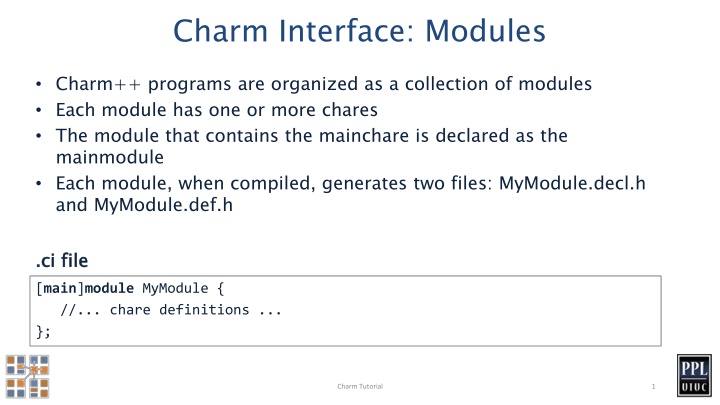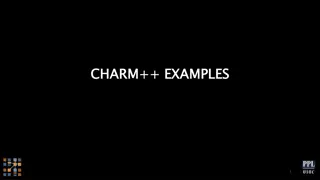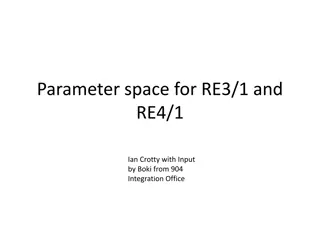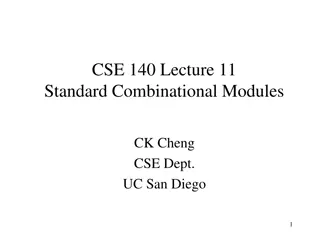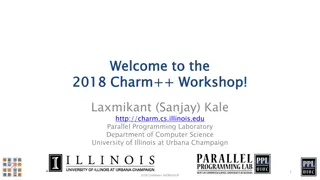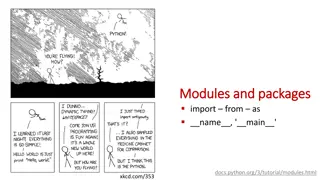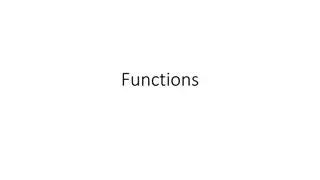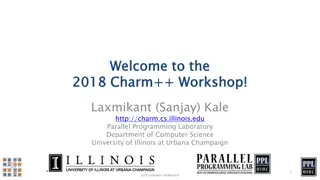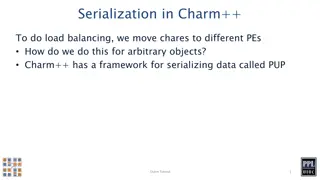Organizing Charm++ Programs with Modules and Chares
Collection of modules in Charm++ programs contain chares, with mainchare in mainmodule. Entry methods for asynchronous invocation, mainchare execution, chare creation, and communication among chares are detailed.
Download Presentation

Please find below an Image/Link to download the presentation.
The content on the website is provided AS IS for your information and personal use only. It may not be sold, licensed, or shared on other websites without obtaining consent from the author.If you encounter any issues during the download, it is possible that the publisher has removed the file from their server.
You are allowed to download the files provided on this website for personal or commercial use, subject to the condition that they are used lawfully. All files are the property of their respective owners.
The content on the website is provided AS IS for your information and personal use only. It may not be sold, licensed, or shared on other websites without obtaining consent from the author.
E N D
Presentation Transcript
Charm Interface: Modules Charm++ programs are organized as a collection of modules Each module has one or more chares The module that contains the mainchare is declared as the mainmodule Each module, when compiled, generates two files: MyModule.decl.h and MyModule.def.h .ci file .ci file [main]module MyModule { //... chare definitions ... }; Charm Tutorial 1
Charm Interface: Chares Chares are parallel objects that are managed by the RTS Each chare has a set of entry methods, which are asynchronous methods that may be invoked remotely The following code, when compiled, generates a C++ class CBase_MyChare that encapsulates the RTS object This generated class is extended and implemented in the .cpp file .ci file [main]chare MyChare { //... entry method definitions ... }; .cpp file class MyChare : public CBase_MyChare { //... entry method implementations ... }; Charm Tutorial 2
Charm Interface: Entry Methods Entry methods are C++ methods that can be remotely and asynchronously invoked by another chare .ci file entry MyChare(); / constructor entry method / entryvoid foo(); entry void bar(int param); .cpp file MyChare::MyChare() { / ... constructor code ... / } MyChare::foo() { / ... code to execute ... / } MyChare::bar(int param) { / ... code to execute ... / } This necessitates changing both (or all: .ci, .h, .cpp) files if you add/remove/change a parameter to an entry method, which is a common pitfall Charm Tutorial 3
Charm Interface: mainchare Execution begins with the mainchare s constructor The mainchare s constructor takes a pointer to system- defined class CkArgMsg CkArgMsg contains argv and argc The mainchare will typically creates some additional chares There can be more than one chare.. They all will start, in unspecified order, on one of the PEs. But it is customary to have only one main chare in a program. Charm Tutorial 4
Creating a Chare A chare declared as chareMyChare {...}; can be instantiated by the following call: CProxy_MyChare::ckNew( constructor arguments ); To communicate with this class in the future, a proxy to it must be retained CProxy_MyChare proxy = CProxy_MyChare::ckNew(arg1); Charm Tutorial 5
Chare Proxies A chare s own proxy can be obtained through a special variable thisProxy Chare proxies can also be passed so chares can learn about others In this snippet, MyChare learns about a chare instance main, and then invokes a method on it: .ci file entry void foobar(CProxy_Main main); .cpp file MyChare::foobar(CProxy_Main main) { main.foo(); } Charm Tutorial 6
Hello World with Chares hello.cpp hello.ci hello.ci hello.cpp mainmodule hello { mainchare Main { entry Main(CkArgMsg m); }; chare Singleton { entry Singleton(); }; }; #include <stdio.h> #include hello.decl.h class Main : public CBase_Main { public: Main(CkArgMsg m) { CProxy_Singleton::ckNew(); }; }; class Singleton : public CBase_Singleton { public: Singleton() { ckout << Hello World! << endl; CkExit(); }; }; #include hello.def.h Charm Tutorial 7
Charm Termination There is a special system call CkExit() that terminates the parallel execution on all processors (but it is called on one processor) and performs the requisite cleanup The traditional exit() is insufficient because it only terminates one process, not the entire parallel job (and will cause a hang) CkExit() should be called when you can safely terminate the application (you may want to synchronize before calling this) Charm Tutorial 8 SC'17
Chare Creation Example: .ci file mainmodule MyModule { mainchare Main { entry Main(CkArgMsg m); }; chare Simple { entry Simple(int x, double y); }; }; Charm Tutorial 9
Chare Creation Example: .cpp file #include MyModule.decl.h class Main : public CBase_Main { public: Main(CkArgMsg m) { ckout << Hello World! << endl; CProxy_Simple::ckNew(12, 3.1415); } }; class Simple : public CBase_Simple { public: Simple(int x, double y) { ckout << Radius: << x << , Area: << y*x*x << endl; CkExit(); } }; #include MyModule.def.h Charm Tutorial 10
